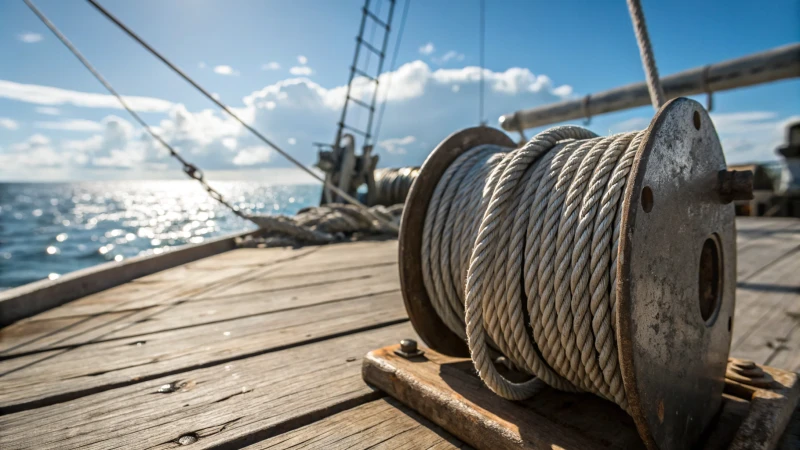
When you're out at sea, the last thing you want is your gear letting you down. That's why corrosion-resistant steel wire ropes are a game-changer for fishing and towing.
Corrosion-resistant steel wire ropes offer unmatched durability for fishing and towing in harsh marine environments, ensuring longer service life and fewer maintenance headaches.
I remember the first time I faced a serious equipment failure out at sea. It was a calm day, perfect for fishing, but halfway through, our regular wire rope gave out. The rust had eaten away at its strength without us even realizing it. That's when I decided to switch to corrosion-resistant steel wire ropes. Not only did they last significantly longer, but they also saved us from potential safety hazards and costly downtime.
If you work in marine environments, you know how unforgiving saltwater can be. Corrosion-resistant ropes aren't just about longevity; they're about peace of mind. You can spend less time worrying about equipment failure and more time focusing on what matters—whether that's catching the big one or ensuring a smooth towing operation.
Incorporating these ropes into your setup isn't just a smart move; it's essential for anyone serious about marine work. Plus, with a little upkeep, these ropes can keep performing season after season, saving you time and money in the long run.
Corrosion-resistant ropes last longer in marine environments.True
These ropes withstand harsh conditions, reducing wear and tear.
Non-corrosion-resistant ropes are cheaper to maintain.False
They require frequent replacements due to rust, increasing costs.
Why Are Corrosion Resistant Steel Wire Ropes Perfect for Marine Use?
Imagine being out at sea, with your equipment facing the relentless assault of saltwater. That's where corrosion-resistant steel wire ropes come to the rescue, offering durability and peace of mind.
Corrosion-resistant steel wire ropes are perfect for marine use because they can endure tough saltwater conditions, boast high tensile strength, and provide a long-lasting solution, which ultimately cuts down on maintenance and replacement expenses.
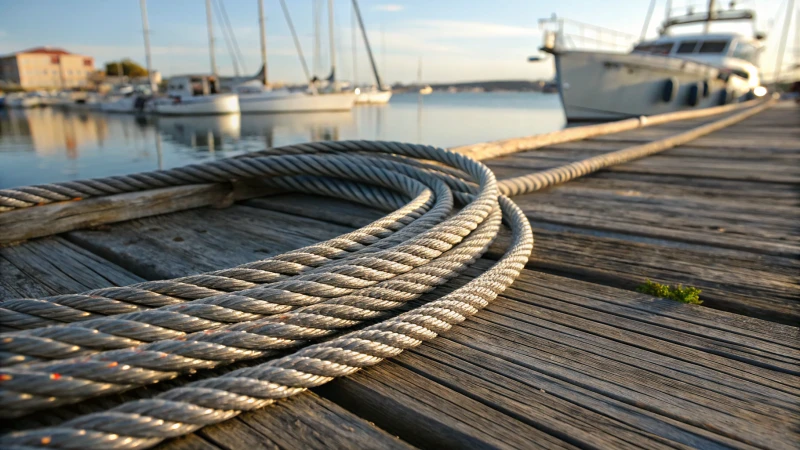
The Science Behind Corrosion Resistance
Let me take you back to a day when I was on a boat trip, and I remember watching the crew handle these robust, shiny ropes. They were using what I later learned were corrosion-resistant steel wire ropes, crafted from stainless steel alloys like AISI 304 or AISI 316. These alloys include chromium, creating a protective layer when exposed to oxygen. This was fascinating to me because it’s this layer that stops the ropes from rusting.
In the harsh marine environment, where salt is a constant enemy, this corrosion resistance is crucial. Salt accelerates corrosion in regular steel, leading to quick wear and tear. But with these stainless steel ropes, the chromium acts as a shield against such degradation, which I found truly impressive.
High Tensile Strength
I was once helping a friend who works in marine towing and saw firsthand how these ropes are engineered to bear enormous loads. Whether for fishing or towing, their high tensile strength1 means they can handle substantial stress without breaking. Watching them in action was like seeing a well-oiled machine at work.
The ropes are made from multiple strands twisted together, providing both flexibility and strength. This design allows tension to spread evenly across the rope's length, reducing the risk of snapping under pressure—a reassuring sight when you’re out at sea.
Extended Service Life
One of the most compelling benefits I’ve observed is the extended service life of these ropes. Imagine a product that lasts up to 50% longer than its traditional counterparts. This longevity not only reduces operational disruptions but also cuts down maintenance costs significantly.
| Feature | Benefits |
|---|---|
| Corrosion Resistance | Protects against saltwater damage |
| High Tensile Strength | Supports heavy loads |
| Extended Service Life | Reduces replacement frequency |
| Cost Efficiency | Lowers maintenance and replacement costs |
Reduced Maintenance Costs
The durability of these ropes means fewer replacements are necessary over time. This translates to reduced operational costs, a crucial factor for industries relying on marine operations. Companies can invest savings back into other areas of their business.
The combination of these factors makes corrosion-resistant steel wire ropes a preferred choice for professionals across various sectors that operate in harsh maritime conditions. Their ability to withstand environmental challenges while maintaining performance is unmatched.
For more insights on marine applications2 and how these ropes integrate into different industries, further reading is recommended.
Stainless steel ropes last 50% longer in marine settings.True
Industry data shows corrosion-resistant ropes have a longer lifespan.
AISI 304 stainless steel contains no chromium.False
AISI 304 stainless steel contains chromium, aiding corrosion resistance.
How Do Corrosion-Resistant Ropes Minimize Operational Disruptions?
Have you ever wondered why some ropes last longer in harsh environments than others?
Corrosion-resistant ropes significantly reduce operational disruptions by extending equipment lifespan, decreasing maintenance needs, and providing reliable performance in challenging environments. This results in enhanced safety and cost efficiency across various sectors.
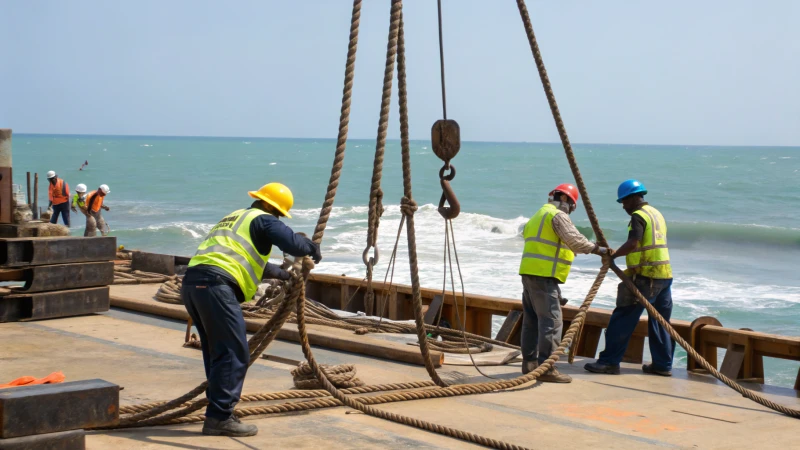
The Science Behind Corrosion Resistance
Imagine being on a fishing boat, far from shore, and suddenly, your main rope snaps due to corrosion. Not only does it jeopardize the catch, but it also puts everyone on board at risk. That's why understanding the science of corrosion resistance is crucial. Corrosion occurs when materials break down due to environmental factors like saltwater or industrial chemicals. Corrosion-resistant ropes are designed with unique coatings or materials such as stainless steel to combat these degrading reactions3. By maintaining their structural integrity longer, these ropes prevent unexpected failures, ensuring smoother operations.
Advantages in Construction and Marine Industries
I remember working on a massive construction project where every delay felt like watching money slip through our fingers. In construction, even a short halt can inflate costs dramatically. By using corrosion-resistant ropes, we kept lifting operations on schedule without interruption from equipment failures. In marine environments, these ropes stand up to saltwater and extend their service life significantly—something I learned firsthand during a stint in the fishing industry, where such ropes lasted 50% longer according to a study in the fishing industry4.
Cost-Benefit Analysis
Initially, I was skeptical about investing more in corrosion-resistant ropes. But when I did the math, the long-term savings were undeniable. Here's a simple breakdown:
| Cost Aspect | Regular Ropes | Corrosion-Resistant Ropes |
|---|---|---|
| Initial Investment | Lower | Higher |
| Maintenance Frequency | High | Low |
| Replacement Rate | Frequent | Rare |
| Long-term Cost | High | Low |
Safety Enhancements
I can't stress enough how important safety is in any industry that relies on heavy machinery. Using corrosion-resistant ropes provides peace of mind because they significantly reduce the likelihood of unexpected failures. This not only protects workers and equipment but also ensures compliance with safety regulations5—a critical factor I've had to account for in every project I've managed.
Understanding the role of corrosion-resistant ropes in reducing disruptions helps industries make better decisions about their operational strategies and material choices.
Corrosion-resistant ropes last 50% longer in marine settings.True
A study showed a 50% increase in service life with corrosion resistance.
Initial costs for corrosion-resistant ropes are lower than regular ones.False
Corrosion-resistant ropes have a higher initial investment cost.
How can I extend the lifespan of my wire ropes?
Ever wondered how a simple piece of equipment like a wire rope can make or break your project?
To prolong the lifespan of wire ropes, regularly inspect them, apply proper lubrication, avoid overloading, and store them in dry conditions. Consistent maintenance ensures safety and optimal performance.
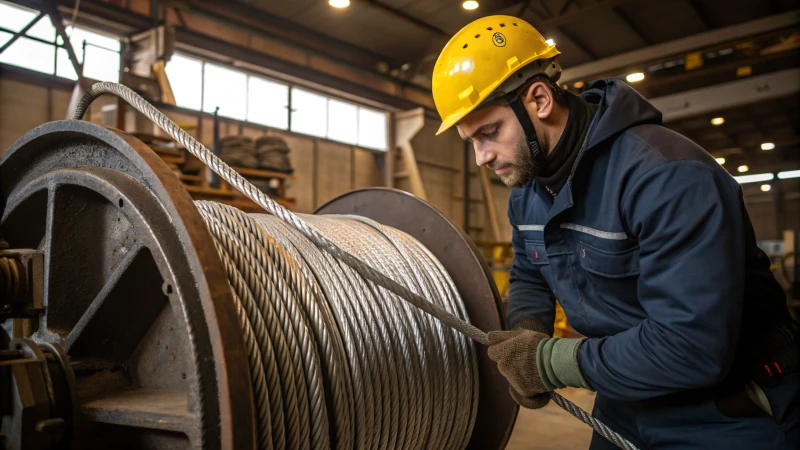
Regular Inspections
Imagine it’s a crisp morning, and I'm on-site with a steaming cup of coffee in hand, watching the team prepare for the day's work. It’s easy to overlook the little details when the big machines are in motion. But those tiny details, like a frayed wire on a rope, could mean all the difference between a smooth day and an unexpected halt. Regular inspections, even just a quick visual every few weeks6, help me catch these issues early. It’s like noticing that one loose thread on your favorite sweater before it unravels completely.
| Inspection Frequency | Type of Use |
|---|---|
| Daily | Heavy-duty lifting |
| Weekly | Moderate industrial use |
| Monthly | Light or infrequent use |
Proper Lubrication
There’s something satisfying about watching a well-oiled machine run flawlessly. I’ve learned that keeping wire ropes lubricated is crucial—like making sure my bike chain is smooth before a weekend ride. A suitable lubricant not only keeps the ropes moving with ease but also shields them from corrosion, especially when they’re exposed to the elements. Apply it generously and ensure it penetrates deeply to protect the core.
Avoiding Overloads
I remember the time when I was tempted to push my car just a bit further than usual on a long trip—only to realize that overloading anything, whether it's a trunk or a wire rope, isn't worth the risk. Adhering to recommended load limits7 ensures these ropes stay reliable. And with load monitoring devices, it’s like having a digital co-pilot ensuring everything is within safe parameters.
Safe Storage Practices
Once, after a long day, I absentmindedly left my tools out overnight. The next morning, they were rusted from dew. Lesson learned: always store wire ropes in cool, dry places. Coiling them neatly and off the ground prevents unnecessary wear and tear, just like keeping my cherished tools safe in their designated spots.
Implementing a Maintenance Schedule
Creating a routine maintenance schedule feels akin to plotting out my family calendar—it ensures everything runs smoothly without hiccups. Cleaning, lubricating, and inspecting regularly not only helps me track wear patterns over time but also makes sure that when the unexpected happens, I'm ready.
Example Maintenance Schedule8:
| Task | Frequency |
|---|---|
| Inspection | Weekly |
| Lubrication | Monthly |
| Cleaning | After each use |
By embracing these maintenance practices, I've found that not only do they extend the life of our wire ropes but they also boost safety and efficiency on-site. It’s comforting to know that with these guidelines, we’re minimizing risks and keeping costs under control—leaving more room for what truly matters: getting the job done right.
Regular inspections detect wire rope damage early.True
Frequent inspections reveal wear, corrosion, and broken wires, preventing accidents.
Wire ropes can be stored in any environment safely.False
Moisture exposure can cause rust; store in a cool, dry place.
How Do Different Types of Wire Ropes Compare in Corrosion Resistance?
Ever find yourself tangled in the dilemma of choosing the right wire rope for your project? I’ve been there! The choice can make all the difference, especially when it comes to corrosion resistance.
Wire ropes differ in corrosion resistance mainly due to their material composition. Stainless steel ropes excel in resisting corrosion, making them ideal for harsh environments, while galvanized ropes offer moderate protection. Choosing the right material hinges on specific environmental conditions and application needs.
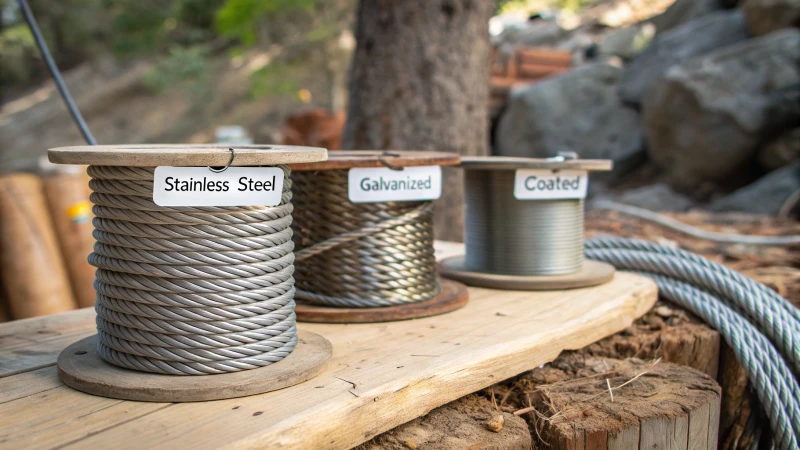
Understanding Wire Rope Materials
When I first delved into the world of wire ropes, it felt like navigating a maze of options. Each type comes with its unique set of properties, especially regarding corrosion resistance9. You have stainless steel, galvanized steel, and uncoated steel each vying for attention in specific scenarios.
Stainless Steel Ropes
Imagine standing by the ocean, where the salty breeze could eat away at anything unprotected. That's where stainless steel ropes shine. Thanks to chromium, these ropes develop a protective shield against corrosion. I remember a time when I was involved in a project near the coast. We opted for stainless steel ropes, and they stood the test of time against the relentless saltwater.
- Applications: Perfect for marine, chemical, and food processing industries where corrosion is a constant battle.
- Pros: Unmatched in corrosion resistance with a polished look that pleases the eye.
- Cons: They can stretch the budget a bit more than other materials.
Galvanized Steel Ropes
Think of these ropes as your trusty, everyday workhorse. They’re coated in zinc to offer a moderate level of protection. Once, during a construction job, we needed something robust yet cost-effective for outdoor rigging. Galvanized ropes fit the bill perfectly, balancing performance with budget constraints.
- Applications: Ideal for outdoor construction and crane systems where budget and durability need to meet.
- Pros: Economical and offers decent corrosion protection.
- Cons: Keep an eye on them as the zinc can wear off over time.
Uncoated Steel Ropes
These are like the unsung heroes working behind the scenes indoors or temporarily. Maintenance is key here; neglect can lead to rust quickly. On a personal note, we used these for a brief installation where cost was paramount, and they worked just fine with some TLC.
- Applications: Best for indoor use or short-term projects.
- Pros: Easy on the wallet.
- Cons: Needs regular upkeep and offers minimal corrosion resistance.
Comparative Table of Corrosion Resistance
| Type of Wire Rope | Corrosion Resistance | Cost | Typical Use |
|---|---|---|---|
| Stainless Steel | High | $$$ | Marine, chemical |
| Galvanized Steel | Moderate | $$ | Construction |
| Uncoated Steel | Low | $ | Indoor |
Choosing Based on Environment
I’ve learned that selecting the perfect wire rope is much like picking a tailored suit—it needs to fit just right with your environment's quirks. Whether you’re battling humidity by the coast or maneuvering through urban smog, your choice should reflect those challenges. For humid coastal jobs, stainless steel10 is unbeatable in rust resistance.
Here's what to consider:
- Coastal or Marine Use: Stainless steel becomes your best ally.
- Industrial or Urban Areas: Galvanized steel is generally sufficient unless pollutants are off the charts.
- Controlled Indoor Environments: Uncoated steel might be a winner if you’re pinching pennies.
For deeper dives into wire rope applications and making the best choice tailored to your project’s demands, you might want to explore various wire rope applications11. Your projects deserve the best foundation for success.
Stainless steel ropes are ideal for marine environments.True
Stainless steel's chromium oxide layer offers superior corrosion resistance.
Uncoated steel ropes are best for outdoor use.False
Uncoated steel lacks corrosion resistance, unsuitable for outdoor use.
Conclusion
Corrosion-resistant steel wire ropes enhance durability and safety for fishing and towing in marine environments, significantly reducing maintenance costs and extending service life compared to traditional ropes.
-
Discover the tensile strength capabilities of corrosion-resistant steel wire ropes to ensure they meet your marine application needs. ↩
-
Explore detailed examples of how corrosion-resistant steel wire ropes are used in marine settings for various industrial purposes. ↩
-
Discover the mechanisms behind corrosion-resistant coatings to understand how they prolong rope lifespan. ↩
-
Learn from real-world data how corrosion-resistant ropes outperform standard options. ↩
-
Explore how using corrosion-resistant ropes enhances workplace safety and compliance. ↩
-
Learn about recommended inspection frequencies to ensure safety and longevity of wire ropes in various industrial applications. ↩
-
Understand the load limits to prevent overloading and potential damage to wire ropes, ensuring safe and efficient operations. ↩
-
Explore a detailed maintenance schedule that can help in organizing regular upkeep activities for steel wire ropes. ↩
-
Understanding why stainless steel resists corrosion helps select the best material for marine applications. ↩
-
Explores why stainless steel is optimal for coastal environments prone to rust. ↩
-
Learn about wire rope versatility across various industries for informed procurement. ↩

